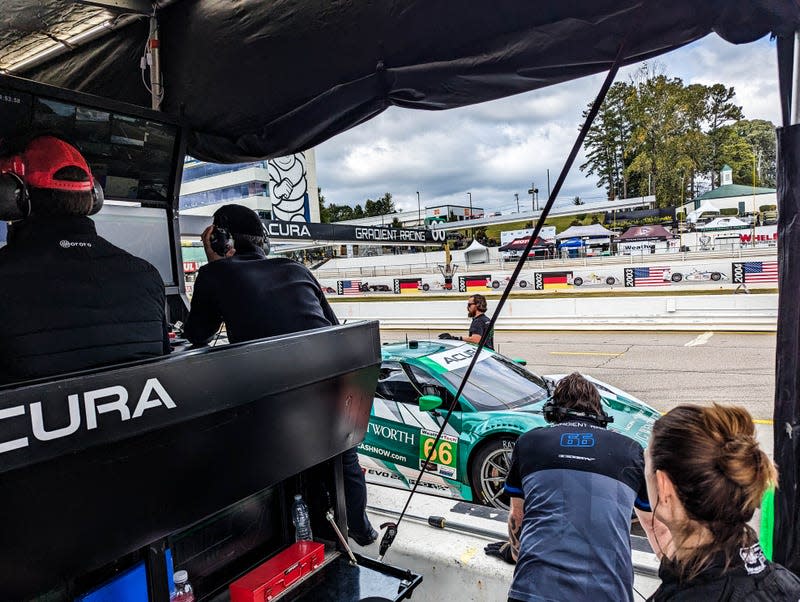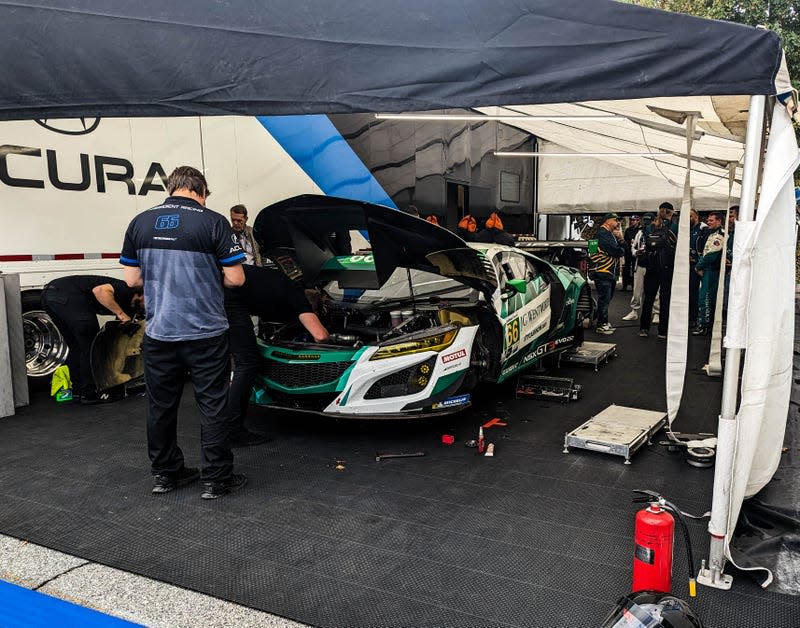The Glorious Highs And Painful Lows Of Motorsport, As Told By Gradient Racing's Andris Laivins
Fairytale weekends are rare in motorsport, but during the 2022 Petit Le Mans IMSA weekend at Road Atlanta, Gradient Racing had just that kind of weekend. An unidentified electrical fault prevented the GTD team from qualifying, which meant that the team started from the very back of the grid. Before the race, the team tore apart the entire car, found the issue, and repaired it before the green flag. Thankfully, the 10-hour duration of the event was long enough that Gradient Racing picked up one place after another and ultimately took the class victory.
As I shadowed the team during the 2023 IMSA finale, I heard that story time and again; this event would mark one year since the whirlwind season conclusion, the weekend that seemed too good to be true. It wasn’t until I spoke to team owner Andris Laivins after qualifying that I learned what happened next: Gradient Racing almost fell apart.
Read more
R.I.P. Andre Braugher, star of Homicide: Life On The Street and Brooklyn Nine-Nine
Tommy DeVito, Daniel Jones and the stupidity of the New York Giants’ QB room
Netflix released actual viewership data, and apparently everybody watched The Night Agent
That evaporation occurred as IMSA was finalizing its 2023 entries. The series knew it would be oversubscribed heading into the coming year, but teams with longevity — like Gradient Racing — were given priority in retaining a competitive slot. But without the funds to secure that slot, Laivins had to inform IMSA that his team might be backing down.
“A lot of people put a lot of effort into making hundreds of phone calls to track down leads,” Laivins said in an hourlong interview with Jalopnik. Even driver Katherine Legge was on the phone, hoping to find the money to continue the program she’d signed up to join. In his two decades of motorsport involvement, Laivins said October 2022 was his worst month, hands down.
The money came. The Acura NSX GT3 Evo22 hit the track with J.G. Wentworth sponsorship. But the 2023 season was far from the rags-to-riches storyline that the team had hoped for.
Full disclosure: Gradient Racing invited me to the 2023 running of Petit Le Mans to shadow the team; I’ve been dying to do so for a while in order to learn more about a team local to me.

When I told various people what I was at Road Atlanta to do, I ultimately heard Gradient Racing described in various different ways. It’s the “scrappy” team. The “budget” team. The little team that could. I also heard ample praise. Three different people told me that if they could work with any team on the IMSA grid, it would be Gradient. One person asked if I’d be willing to say hello to their favorite people on the team — then listed off the entire at-track staff. This is, after all, the team that rescued a kitten at Road Atlanta during the throes of its chaotic 2022 weekend; few team owners would worry about a lost kitten while their car was in shambles, but Laivins didn’t hesitate to cancel his flights to drive this kitten home.
Gradient Racing was founded in 2019 after Laivins parted ways with CJ Wilson Racing to form his own company based in Texas. Formally trained in studio art, Laivins found that his passion for working with his hands translated well into work as a metal fabricator, which saw him transition into part-time work at a race team. Next came a fabrication shop in Austin and a partnership with Texas Rangers pitcher Wilson, where Laivins helped the group grow beyond its MX-5 Cup roots.
Where most race team owners are gregarious and charismatic masters of the PR spin, Laivins is far more subdued and soft spoken. He’s the kind of boss who runs a tight ship with well-earned respect, not with the loudness of his voice or the brashness of his personality.
“The business of race teams is just atrocious,” he told me. “I would legitimately really enjoy everything I do every day if I didn’t have to run the business. I hate trying to find money; it’s the opposite of my personality.”

And motorsport is a money game, especially in this modern era. Laivins told me that, five years ago, IMSA was still a serious endeavor, but the rapid growth in technology and competition has created an atmosphere even more cutthroat than before. Everything costs more money, because everyone is investing more money into finding success.
“This is an extremely tiny and very weird marketplace that our business operates in, and it doesn’t operate under any normal rules of capitalism or commerce,” he said. “It operates on these totally unhinged factors. In any normal market for something, there’s an array of customers and products to be sold, and as a business, you’re trying to approach a massive market of people that will buy your product.
“In what we do — in this paddock, at this level of racing — is like, most of them aren’t even running a real business. It’s just that somebody owns the team and can spend their own money to run it. So you end up with this really small number of actual businesses that are pursuing actual deals, customers, sponsors, or whatever. So the normal rules you’d expect a business like this to operate by start falling away, because the market is so tiny. There are eight of us pursuing the five viable deals that will exist next year.
“Then all these factors go into it that don’t really follow logic — like someone who doesn’t want to pay for a Lamborghini race team because they just hate Lamborghinis. As a team owner, you’re like, oh, I only own a Lamborghini; that’s the one gigantic, extraordinarily expensive asset that I have to run my business off of, and these guys are like, no, I just don’t like them. Now, out of those five viable deals, you’re down to four.”

 Yahoo Autos
Yahoo Autos 